Jimi takes on a brief overview of why dogs bark along with a few tips of how to stop dog barking.
3 Reasons Why Dogs Bark:
- Stress – Barking usually occurs with a new place or new element such as a person coming to visit. The dog is not confident and barks.
- Anxiety – Barking due to anxiety usually occurs at the beginning or end of a scenario such as when a person walks in and the dog gets excited and barks. The same thing can occur if someone (particularly the owner) leaves the dog alone.
- Boredom – Dogs bark out of boredom too! This can happen if your dog is left in the back yard. Leaving your dog in the back yard can actually be very unhealthy and could cause even more bad habits like digging.
How to Stop Dog Barking – Tips
If your dog is barking, DO NOT punish or correct the dog for it’s behavior. Also, DO NOT touch or pet the dog! We see so many owners grab their dogs and start petting them in the attempt to calm the dog down. Doing this will only reinforce your dog to continue barking. It’s best to remain calm, don’t escalate or heighten the situation.
We are here for you!
We’d love for you to share your dog barking experiences with us in the comments below. We do our best to answer every question posted!

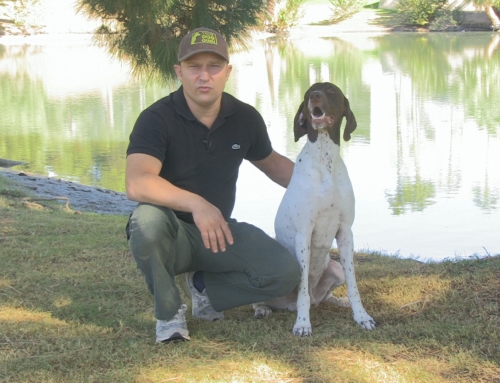
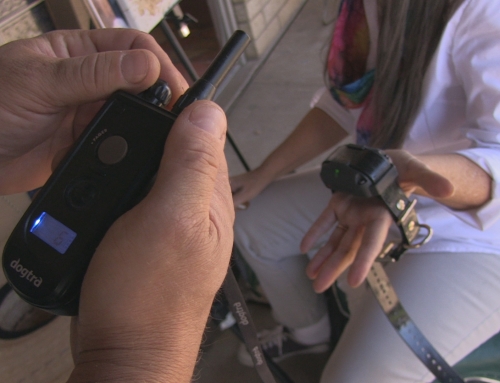
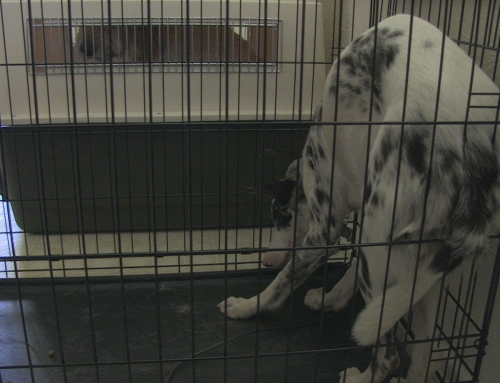
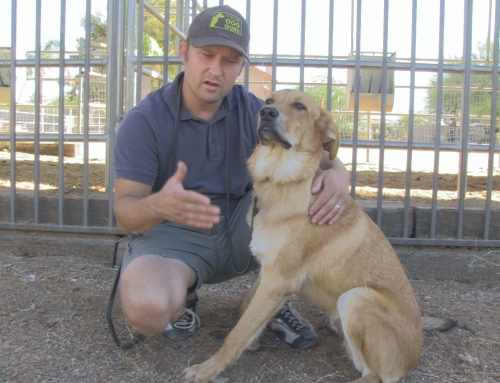
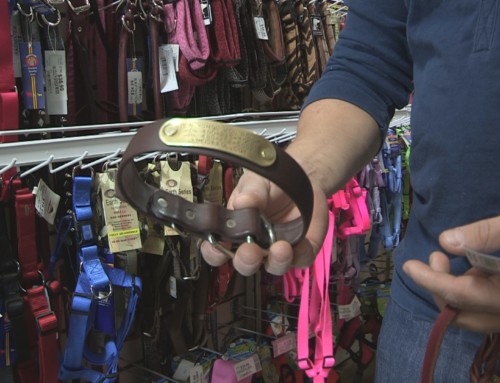
We have a Maltese that barks excessively. he barks at every little sound he hears. please help.
How old is the dog? How long does the barking last? How often does it occur? How long has the dog had this problem? Please provide as much information as possible…it can help us narrow the problem down for you.
My 2 year old German Shepard recently began to bark when we leave the house. We have had less time for him lately, with a new baby, but I am afraid he is starting a bad habit. He has a door that he uses well, and it seems if we keep him from going out he will still bark in the house. We have broken some of his bad habits of digging in the past, I don’t want to do anything harmful in dealing with this new bad habit. I was thinking about finally investing in a Dogtra collar but unsure if this will be helpful for this behavior. He also is difficult to walk at times and was hoping to use the collar for this as well. Are there more videos available to help with these behaviors? I can’t seem to find any others that you mention in the video above. Please help.
Hi Brandon, sorry for the very late reply to your comment… somehow it got buried in our message queue! To answer your question, if you’re having issues with barking and difficulty walking your dog, do not even think about purchasing an electronic collar until you’ve put in the time making sure your dog’s obedience and overall training foundation is very solid first. Electronic collars are a communication tool and if you do not have clear communication channel established with your dog, adding tools into the mix will only further confuse your dog or create a reliance on needing that tool to be present in order to gain cooperation. Let us know where you’re currently at with training and we’ll do our best to make some helpful suggestions. Thank you! –YDG
I have a 16 month Samoyed. She is a great dog, only challenge we really face is that we have an in ground pool and she barks every time we try to go it. She runs around the pool and keeps barking. I’m guessing she is stressed out and worried about us but what can we do? She isn’t afraid of water she will go in a bit, it’s just that most all of the time she barks.
Hi Mary, every behavior is taught (whether voluntarily or involuntarily). Early on if you Samoyed was barking near the pool and everyone was excited and never corrected the barking initially, that it actually had the adverse effect and reinforced the barking. Kids, being hyper and happy as they usually are around the pool, can amplify issues even more. What you can do initially is instead of letting your dog run around the pool freely, give her a place (or down) command, then get into the pool and if she does not bark, praise and reward with her favorite toy. If she does bark or breaks the command, do not overly react and return her back to the down/place position in the same spot given originally and start over. Continue repeating this training exercise for longer and longer durations. Make sure the overall energy around the pool is very calm. Give it a try and let us know how it works out for you. These are all things that we teach in our online video course if you’re looking to continue working on your Samoyed’s training. –YDG
Hi! I have two dogs named Huck and Piper. Huck is a Miniature Australian Shepherd and he is 2.5 years old. Piper is a standard Australian Shepherd and she is a little over 1 year old. They are both great dogs, super intelligent and loving, but Piper the younger of the two has some issues I am trying to figure out how to best address. Piper is naturally a little anxious and high strung, when she hears noises outside our house she barks and whines like she is excited/nervous. She is also leash reactive. When we walk her down the street if she sees any person or dog she barks and lunges at them until she can get close enough to smell them and then she stops. She is fine off leash at the dog park or the dog day care we take her to near our house, it is mainly just on walks that she barks at people excessively and its difficult to walk her anywhere with a lot of people. I’ve been walking the dogs separately because Piper’s bad habits were starting to wear off on Huck but I want to be able to take both my dogs on a walk together. Any advice would be much appreciated! Thank you!
Piper is distressed when she’s restrained whether it’s by the walls of your home or on a leash during walks, and she’s reacting by barking, whining, lunging. You need to focus on building a stronger relationship and form clear communication with her. We go over this all in our online program. You can actually train barking (and stop barking) as commands which will give you control over it. I would continue walking your two dogs separately and avoid areas where untrained dogs interact with eachother such as dog parks or doggy day care. If you need to board your dog, try to find a trainer, friend or even Vet’s office that understands your dog’s issues and will tend to them on an individual basis. Remember, there is no quick fix in dog training. Issues like this are a daily effort and can take months to resolve.
My 5 yr old female Shepherd barks at the mail carriers, spins around in a circle, gets herself in a frenzy, until I pull her by the collar and remove her from sight of the mailman. She also does this while in the car, at other dogs, bikes, motorcycles,…I’ve had her since one month. She is a talker. She dominates the two males, a 100 # Rott X, and a Husky/Wolf X, who are 8. She’s very good helping me with my elderly mother, and understands a lot!…but when it comes to someone else, especially delivery people?… idk if their apprehension sets her off? Because sometimes when a stranger comes to the door for an appt, she’s cautious but does not react!…
I should mention I’ve also been a Rover sitter, so I’ve had plenty of dogs I dogsit in my house. Once she meets them and lays down the rules to them, she’s fine, but will not put up with any crap from any dog.
She’s stubborn, now at 5, thinking she doesn’t always have to obey my commands, she tests me, but I do follow through.
Any comments? We were in LosAngeles, but we are in Cleveland now. I just moved my elderly mother back home with my 3 dogs.
She’s my angel. She’s very affectionate.
She’s neurotic about the ball, soccer balls, lg rubber rope ball. It’s her one thing that re-focuses here. She is 60 #, and black and grey with a black muzzle. She might have Mal in her.
Thank you!
Hi Paula! It sounds like you’ve got a lot going on but it’s nothing we don’t hear about on a daily basis from other dog owners. The first thing you need to do is stop trying to attribute reasons as to why your dog does certain things. People like to give dogs human characteristics and thought processes which are almost always incorrect. It simply comes down to the fact that your dog was never taught how to behave in these situations in an effective way that was clear and easy for them to understand. Instead, in situations like when she’s barking at a mail carrier, forcefully pulling her by the collar trying to remove her is actually increasing the pressure and reactivity towards the mail carrier, not helping it. There are many things in dog training that seem counter-intuitive, so you must also educate yourself with the correct training methodology and techniques to follow. This is why a structured training program (like our online interactive program) is SO important. Training dogs is not about identifying problem areas and looking for ways to fix them quickly one by one… Instead, it’s about starting back at square one and really building a strong foundation and relationship with your dog. It’s not easy and takes a lot of consistent hard work, but the reward can be so amazing in the end.
Hi there
My dog a 4 year old labraspoodle barks when is wants to be let in from outside, let through a door, wants to be let out of a room etc. How can we prevent this from happening?
Behaviors like this are taught based on previous interactions with your dog. When your dog barks at the door and you open it for him/her, then you just rewarded the barking. Dogs are extremely smart and it only takes one time for them to establish a behavior with an outcome. To fix this, start by being consistent with your dog and never opening the door for him until he’s completely relaxed and quiet. Don’t expect to resolve this overnight either… if he’s been allowed to bark for years, then it can take weeks or even months of consistent effort to reverse this type of behavior.
HI Jimi, my family and I are new to your online training. And we’ve got questions with regards to barking. We have an 8month old german shorthaired pointer mixed with blue heeler and an 18month old chihuahua corgi mixed. Our 8month old barks at our neighbors dogs because we think she wants to play, and be social (she’s super social with both dogs and humans), however, our 18month old chihuahua barks in a more aggressive way, that her fur would all stand up because we find she’s super alert. She’s also super very protective over our 8month old, which is a problem when other dogs/humans wants to play with the 8month old. How do we correct the problem? How do we make the chihuahua to stop behaving or being overly protective? Overall, how do we make them not bark.
Hi! Since you’re part of our online training program we will respond to you there. Thanks!
We’ve got a barking problem. I’ve got a rescue Malinois. He’s always been on the nervous side, but has come a LONG way since I got him. We’ve progressed to being around children, men in coats, hiking off leash… but just can’t get a handle on the barking. We do 30-60 minutes of obedience a day, he gets a minimum of an hour of off leash exercise every day, and I try to intervene quickly and calmly when he barks. We’ve tried a bark collar, which helps a little, but doesn’t extinguish the problem. Any advice? The squirrels drive him crazy, and he’s driving us crazy.
I’m also looking at purchasing the program to improve his impulse control. Is this something you address?
Thank you for your time!
Hi Bree! The key is building up a proper foundation and developing confidence in your dog so that they don’t feel the need to be reactive or bark in any situation. You can spend hours a day working on obedience but if you’re not following a proven and structured training program like ours, then you can end up causing or further reinforcing bad behaviors without even realizing it. Tools like a bark collar will not fix the underlying issues and when used improperly, can make things worse. Our program isn’t about identifying individual issues and trying to fix them one-by-one. It’s about showing you how to lay the appropriate groundwork, make each interaction with your dog productive, creating an environment that sets your dog up for success and forming a strong bond with your dog. The great thing about our online program is that it’s interactive and we encourage all our students to submit video so that we can provide precise feedback and coaching. Hope that answers your question! -YDG
I have a 2 year old Malitpoo that likes to bark at every little noise and when someone walks in also when they leave. I understand that is stress, but I would appreciate if you could help me help him not be so stressed. He is very trainable, because he lets me know when my sugar is low and also when my heart Is beating to fast. I just for some reason can’t get him to stop barking when people walk in my house and when they leave. He started doing this when my daughthers dog moved in with us. My daughters dog started with the barking when someone walks in and leaves. Now My dog Toni is doing the same so I now have two dogs barking and I’m sure it’s driving my vistor’s crazy. I’ve tried having people ignore him when they walk in, but Toni will then get in their laps and demand their attention. I correct him by making a noise to get him out of the mind state he is in then give him a down hand motion. He will get down then go right back to trying to get some love. Will you please tell me what i’m doing wrong? He is such a good dog and responds to most anything else, but this barking is getting out of control. Thank you for taking the time to read this!!!
Hi Wendy! Most dog owners read far too much into their dogs’ behaviors to come up with an explanation. Remember that all behaviors are learned. To better understand this you can research what’s called the “The Antecedent Behavior Consequence Model” or ABC for short. When a new person enters the home and sees a dog, the common reaction is to verbally talk about (or to) the dog with phrases like “oh my! how cute!!!” and/or physically pet or play with the dog. This interaction is rewarding to the dog and reinforces whatever behavior the dog exhibited (e.g. barking) for the setting/scenario that preceded it (e.g. doorbell ring, door opening, new person appearing). Scolding a dog, making a sharp noise or giving a new command can all be perceived by your dog as attention which further reinforces a behavior like barking instead of stopping it. The first step to solving these types of problems is really taking the time to understand how behavior is shaped and identify all the little things that you and other’s in your household are doing that developed these bad behaviors over time. The single most frequent comment we get from new students of our online training program is that they never realized how their normal, everyday interactions with their dog were the root cause of all their bad behaviors! Simply changing basic daily interacts resulted in massive improvements without any training at all. Hope this answers your question. Happy Training! -YDG
I just got a new dog. My husband gifted me. My dog also barks a lot. Sometimes it starts barking late at night and it gets very difficult for me to sleep. This will really help. Thanks for sharing this.